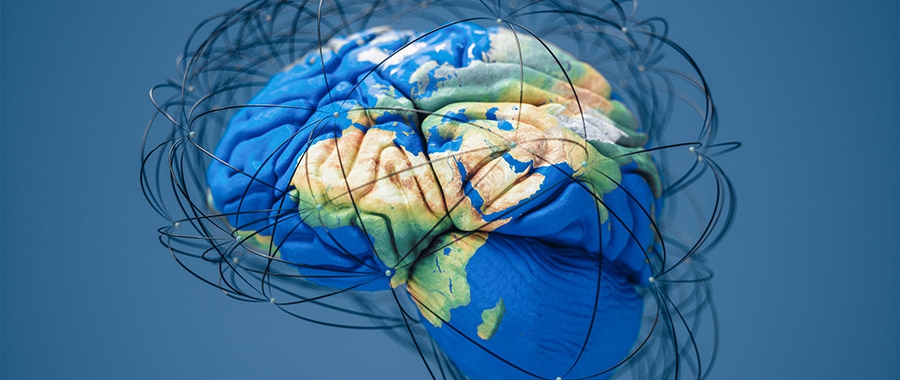The views expressed in our content reflect individual perspectives and do not represent the authoritative views of the Baha'i Faith.
The other day at the store, I heard someone proudly (and loudly) proclaim: “I’m an American Christian, in that order. My loyalty to my country always comes first.”
Since then, I’ve thought quite a bit about that sentiment. It bothers me, even though it seems pretty prevalent among some people.
As a Baha’i, I find patriotism and loyalty to country admirable—but would never, ever put it in front of my connection to the Creator. Countries form, flourish and may eventually fail, but an abiding and everlasting God does not alter or change.
Baha’u’llah, the prophet and founder of the Baha’i Faith, said:
By the righteousness of the Lord! Ye were created to show love one to another and not perversity and rancour. Take pride not in love for yourselves but in love for your fellow-creatures. Glory not in love for your country, but in love for all mankind. – Baha’u’llah, Tablets of Baha’u’llah, p. 138.
“Glory not in love for your country” means something essential and important to all Baha’is. It means that Baha’u’llah’s mission—to unify humanity and bring about the peace and oneness of all nations—intends to raise our vision above mere limited nationalistic patriotism to a larger, more inclusive consciousness of world citizenship:
Today we believe Baha’u’llah to be an educator of humanity, as Abraham, Moses and Jesus were educators. Are His teachings worthy of serious attention? He originated and proclaimed them. He caused others to believe and follow them. What is the function of a teacher and educator of humanity? By what evidence shall we recognize him? Is it not his power to train and develop, as children are trained at school? Has Baha’u’llah trained the children of humanity? If He has opened the doors of human hearts to a higher consciousness, He is a heavenly Educator. – Abdu’l-Baha, responding to interview questions from the Reverend J.T. Bixby at the Hotel Ansonia, New York City, 13 April 1912, Star of the West, Volume 2, p. 7.
Millions of Baha’is all over the world see Baha’u’llah as that latest heavenly educator, a prophet and manifestation of God who truly has “opened the doors of human hearts to a higher consciousness.” The Baha’i teachings ask everyone to aspire to that higher consciousness—not only a heightened inner spiritual consciousness, but also the consciousness of world citizenship:
Thus will the earth be regarded as one country and one home. The most glorious fruit of the tree of knowledge is this exalted word: Of one tree are all ye the fruit, and of one bough the leaves. Let not man glory in this that he loveth his country, let him rather glory in this that he loveth his kind. – Baha’u’llah, Tablets of Baha’u’llah, pp. 127-128.
In this expansive vision of the future the Baha’i teachings proclaim and promise, humanity will no longer allow jingoistic patriotism to provoke hostility, conflict and war—instead, it will inspire a wider loyalty by subordinating love of country to love of the world:
The love of one’s country … has not, through this declaration, this clarion-call of Baha’u’llah, been either condemned or disparaged. It should not, indeed it cannot, be construed as a repudiation, or regarded in the light of a censure, pronounced against a sane and intelligent patriotism, nor does it seek to undermine the allegiance and loyalty of any individual to his country, nor does it conflict with the legitimate aspirations, rights, and duties of any individual state or nation. All it does imply and proclaim is the insufficiency of patriotism, in view of the fundamental changes effected in the economic life of society and the interdependence of the nations, and as the consequence of the contraction of the world, through the revolution in the means of transportation and communication …. It calls for a wider loyalty, which should not, and indeed does not, conflict with lesser loyalties. It instills a love which, in view of its scope, must include and not exclude the love of one’s own country. It lays, through this loyalty which it inspires, and this love which it infuses, the only foundation on which the concept of world citizenship can thrive, and the structure of world unification can rest. It does insist, however, on the subordination of national considerations and particularistic interests to the imperative and paramount claims of humanity as a whole, inasmuch as in a world of interdependent nations and peoples the advantage of the part is best to be reached by the advantage of the whole. – Shoghi Effendi, The Promised Day is Come, p. 121.
The Baha’i Faith calls on each of us, every single human being on Earth, to recognize their global birthright as part of the human family. Yes, we were all born within the confines and borders of a particular country, but those borders can change, shift, be conquered and erased, or even entirely disappear, sometimes overnight. Countries come and go, but the Earth abides. Certainly, as citizens of our villages, our cities, our states and our countries, we have multiple patriotic loyalties. More importantly, and more permanently, we are all born as citizens of this planet, Earthlings, the inheritors and the stewards of the entire globe.
So what does Baha’u’llah’s vision of world unity and the consciousness of world citizenship call for? It envisions:
A world community in which all economic barriers will have been permanently demolished and the interdependence of Capital and Labor definitely recognized; in which the clamor of religious fanaticism and strife will have been forever stilled; in which the flame of racial animosity will have been finally extinguished; in which a single code of international law—the product of the considered judgment of the world’s federated representatives—shall have as its sanction the instant and coercive intervention of the combined forces of the federated units; and finally a world community in which the fury of a capricious and militant nationalism will have been transmuted into an abiding consciousness of world citizenship—such indeed, appears, in its broadest outline, the Order anticipated by Baha’u’llah, an Order that shall come to be regarded as the fairest fruit of a slowly maturing age.
“The Tabernacle of Unity,” Baha’u’llah proclaims in His message to all mankind, “has been raised; regard ye not one another as strangers …. Of one tree are all ye the fruit and of one bough the leaves…. The world is but one country and mankind its citizens …. Let not a man glory in that he loves his country; let him rather glory in this, that he loves his kind.” – Shoghi Effendi, The World Order of Baha’u’llah, p. 40.
















Comments
Sign in or create an account
Continue with Googleor